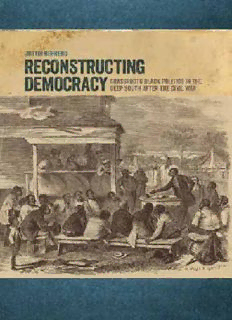
Reconstructing Democracy: Grassroots Black Politics in the Deep South after the Civil War PDF
Preview Reconstructing Democracy: Grassroots Black Politics in the Deep South after the Civil War
Reconstructing Democracy This page intentionally left blank Reconstructing Democracy Grassroots Black Politics in the Deep South after the Civil War JUSTIN BEHREND The University of Georgia Press Athens and London © 2015 by the University of Georgia Press Athens, Georgia 30602 www .ugapress .org All rights reserved Set in Minion Pro by Graphic Composition, Inc. Printed and bound by Thomson- Shore Inc. The paper in this book meets the guidelines for permanence and durability of the Committee on Production Guidelines for Book Longevity of the Council on Library Resources. Most University of Georgia Press titles are available from popular e- book vendors. Printed in the United States of America 18 17 16 15 14 c 5 4 3 2 1 Library of Congress Control Number: 2014952577 isbn- 13: 978- 0- 8203- 4033- 3 (hardcover) ISBN for digital edition: 978-0-8302-4785-1 British Library Cataloging- in- Publication Data available FOR MARIA, ZACHARY, AND MAYA This page intentionally left blank CONTENTS Acknowledgments / ix Introduction. “Wise in Time” / 1 Part One. Constructing Democracy Chapter 1. Into the Arms of Strangers / 13 Chapter 2. Emancipated Communities / 42 Chapter 3. New Friends / 77 Part Two. Maintaining Democracy Chapter 4. “A New Machinery of Government” / 119 Chapter 5. “True to One Another” / 147 Chapter 6. A Deep Interest in Politics / 174 Part Three. Constricting Democracy Chapter 7. “Organized Terrorism and Armed Violence” / 207 Chapter 8. Return of Oligarchy / 235 Notes / 257 Index / 343 This page intentionally left blank ACKNOWLEDGMENTS I owe a great deal of gratitude to a number of institutions and individuals who saw the value in this book and helped to see it to completion. Northwestern University, where this project began as a dissertation, provided essential funds for research and writing. A Faculty Grant from Mount Holyoke College, a Presi- dential Summer Fellowship from suny Geneseo, and additional grants from Geneseo’s Research Council offered important resources to transform my dis- sertation into a book. I also wish to thank the librarians and archivists at the Northwestern University Library; the National Archives, Washington, D.C., and College Park; the Mississippi Department of Archives and History; the Hill Memorial Library at Louisiana State University; the Historic Natchez Founda- tion; the Moorland- Spingarn Research Center, Howard University; the Center for American History, University of Texas at Austin; the Rutherford B. Hayes Presidential Center; and Milne Library, suny Geneseo, who helped me to locate relevant primary sources. I especially wish to thank Anne Webster at the Mis- sissippi Department of Archives and History and Mimi Miller at the Historic Natchez Foundation for making me feel at home in their respective archives. Although I didn’t know it at the time, the seeds for this project were first planted in Ron Davis’s graduate seminar on the U.S. South at California State University, Northridge. He introduced me not only to Natchez but also to the problems and debates of southern history. It has been fourteen years since I was a student at csun, yet Ron has been a continual source of guidance and encouragement. At Northwestern I benefited immensely from great faculty and a supportive cohort of graduate students. Steven Hahn, Stephanie McCurry, Dylan Penningroth, Darlene Clark Hine, and Kate Masur not only guided my dissertation toward completion but also gave me cogent advice in developing this book. I couldn’t have made it through the PhD program without friend- ship and support from Aaron Astor, David Brodnax, Katherine Burns- Howard, Debs Cane, Mike Crane, Greg Downs, Carole Emberton, Erik Gellman, Erik Mathison, Shuji Otsuka, Jarod Roll, Tobin Shearer, David Sellers Smith, Owen Stanwood, Rhiannon Stephens, Erik Taylor, and Dana Weiner.
Description: